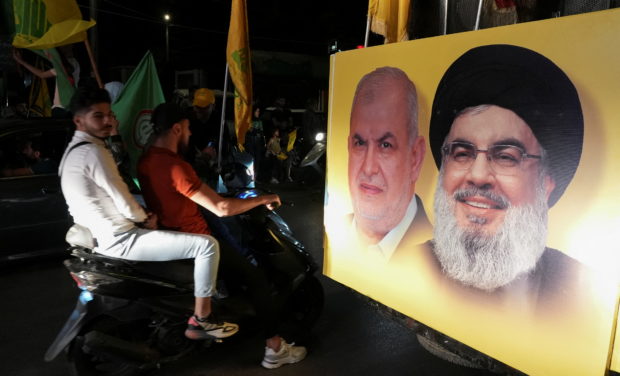Lebanon’s Hezbollah, allies likely to lose parliamentary majority

Supporters carry Hezbollah and Amal Movement flags as they ride in a convoy past a poster depicting Hezbollah leader Sayyed Hassan Nasrallah and Head of Hezbollah’s parliamentary bloc Mohamed Raad, as votes are being counted in Lebanon’s parliamentary election, in Nabatiyeh, southern Lebanon May 15, 2022. REUTERS/Issam Abdallah
BEIRUT — Iran-backed Hezbollah and its allies are likely to lose their majority in Lebanon’s parliament, three sources allied to the group said on Monday, in a major blow to the heavily armed faction that reflected widespread anger at ruling parties.
Sunday’s election – the first since Lebanon’s financial collapse and the Beirut port blast of 2020 – also produced wins for the Saudi-aligned Lebanese Forces (LF), a Christian party, and reform-minded candidates across sects.
Their breakthroughs, however, could fracture parliament into several camps and polarise it more sharply between Hezbollah’s allies and opponents. Those opponents are not currently united into a single bloc.
The deadlock could derail reforms required to unlock support from the International Monetary Fund to ease Lebanon’s economic crisis and delay parliamentary decisions on a speaker, a premier to form a Cabinet, and a new president later this year.
Preliminary results indicate a reversal of Lebanon’s last election in 2018, when Hezbollah and its allies won 71 of parliament’s 128 seats, pulling Lebanon deeper into the orbit of Shi’ite-led Iran and away from Sunni-led Saudi Arabia.
Article continues after this advertisementSunday’s result could open the door for Riyadh to exercise greater sway in Beirut, long an arena of its rivalry with Tehran.
Article continues after this advertisementThere was no immediate comment from Saudi Arabia, but Iran on Monday said it respected the vote and had never intervened in Lebanon’s internal affairs.
The United States, which has imposed sanctions on Hezbollah, welcomed the elections and encouraged politicians to recommit to economic reforms.
‘National celebration’
The interior ministry has announced results for 12 of the 15 districts, but several parties said they would be submitting appeals.
Political sources allied to Hezbollah had earlier said their preliminary counts showed it was improbable the party and its allies would secure more than 64 seats.
Among the notable losses is top Hezbollah ally and deputy parliament speaker Elie Ferzli, 72, who lost the Christian Orthodox seat in West Beqaa, according to official results.
Ferzli lost to a candidate backed by established Druze leader Walid Jumblatt, but Jumblatt’s list also lost a Sunni seat to independent candidate Yassin Yassin.
“After two-and-a-half years of directly facing off in the streets against a government of injustice, finally, we’ve begun the journey to change in Lebanon. This is a national celebration!” Yassin told Reuters.
Other startling losses include Hezbollah-allied Druze politician Talal Arslan, first elected in 1992.
He lost his seat to newcomer Mark Daou, whose opposition list won a total of three seats.
Independent candidate Elias Jradi snatched an Orthodox Christian seat from Assaad Hardan, a pro-Syria MP in Hezbollah’s traditional south Lebanon stronghold.
Firas Hamdan, a lawyer and activist, beat out Marwan Kheireddine, chairman of Lebanon’s AM Bank, one of many that restricted depositors’ access to savings due to a severe dollar shortage during the financial crisis.
The LF said no single grouping had a majority, including Hezbollah, but put its own wins at 20 seats, up from 15 in 2018.
That would allow it to overtake the Hezbollah-allied Free Patriotic Movement (FPM), the biggest Christian party in parliament since 2005.
Founded by President Michel Aoun, the FPM won up to 16 seats, a party official told Reuters, down from 18 in 2018.
Their diminished representation, combined with losses in the south and West Beqaa, would deliver a “major blow” to Hezbollah’s claim of having cross-sectarian support, said Mohanad Hage Ali of the Carnegie Middle East Center.
Nonetheless, Hezbollah and the allied Amal Movement swept all Shi’ite Muslim seats, according to projections from both parties.
Their winners include incumbent MPs Ali Hassan Khalil and Ghazi Zeaiter, both facing charges over the devastating Aug. 4, 2020 Beirut blast. They both deny any wrongdoing.
Sunni representation appeared split between allies and opponents of Hezbollah, amid low turnout for a sect once dominated by leading politician Saad al-Hariri, who has lost Saudi backing.
Hariri’s withdrawal from politics splintered the Sunni political leadership and kept many would-be voters at home.
Impoverished Tripoli, which is Sunni-majority, scored the lowest voter turnout nationwide.
Mustafa Alloush, a former Hariri associate who ran unsuccessfully as an independent there, said families waited for electoral bribes that never came.
“It’s such a sad scene,” Alloush said.
RELATED STORY: